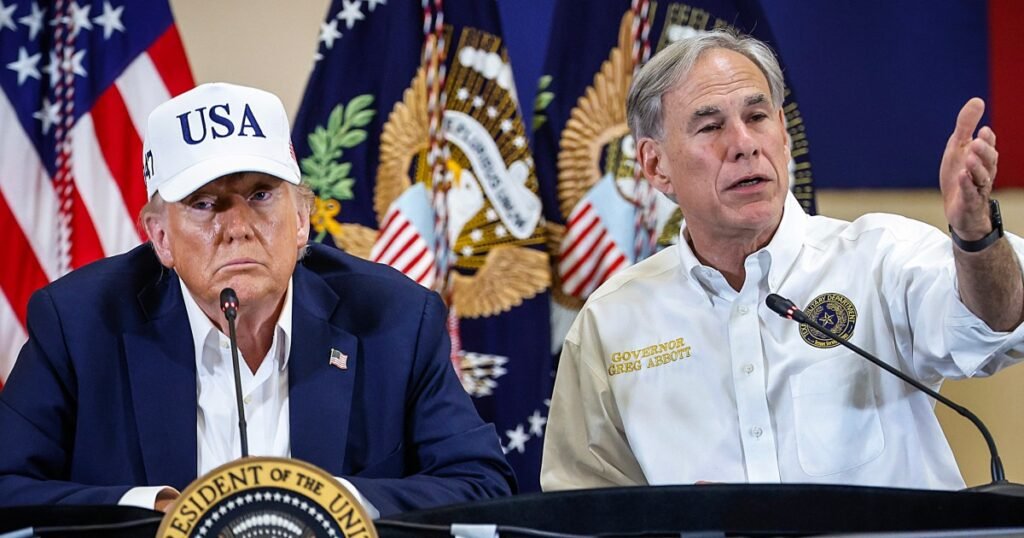Now Reading: Inside the GOP’s new Texas congressional map proposal: From the Politics Desk
-
01
Inside the GOP’s new Texas congressional map proposal: From the Politics Desk
Inside the GOP’s new Texas congressional map proposal: From the Politics Desk

Welcome to the online version of From the Politics Desk, an evening newsletter that brings you the NBC News Politics team’s latest reporting and analysis from the White House, Capitol Hill and the campaign trail.
Happy Wednesday! Today’s edition digs into Republicans’ new proposed congressional map in Texas, which would give the party the chance to pick up five additional seats in the midterms. Plus, Andrea Mitchell looks at the Environmental Protection Agency’s deregulation moves under the Trump administration.
Sign up to receive this newsletter in your inbox every weekday here.
— Scott Bland
Texas Republicans unveil congressional map giving them a chance to pick up 5 seats
By Adam Edelman and Ben Kamisar
Texas Republicans on Wednesday released a proposed new congressional map that would give the GOP a path to pick up five seats in next year’s midterm elections.
The proposal, which follows President Donald Trump’s public pressing for a new map in the state, would shift district lines in ways that target current Democratic members of Congress in districts in and around Austin, Dallas and Houston, as well as two already endangered Democrats representing South Texas districts that Trump carried last year.
If it were enacted, the proposal could have a major effect on the battle for control of the House in 2026. Republicans hold a slim, three-seat advantage right now, but this map could add extra padding as they seek to keep the House for the final two years of Trump’s presidency. They already control 25 of the 38 congressional districts in Texas.
In a sign of how carefully the new lines are drawn to maximize the GOP’s standing, Trump would have carried 30 out of 38 seats on this new map last year, none by single-digit margins.
Democratic voters are packed into eight districts that former Vice President Kamala Harris would have won by at least 15 percentage points each last year, according to analysis from the nonpartisan Texas Legislative Council.
(See how the current map compares to the new proposal)
The proposal may still change before state lawmakers consider it further, and members of the special redistricting committee may still refer new proposals for consideration throughout the special session.
Read more here →
🚨 And catch up here on some other big midterm news from today: Former Vice President Kamala Harris will not run for governor of California, ending months of speculation. Read more →
Amid a scorching summer, a rollback on carbon regulations
Analysis by Andrea Mitchell
With more than 100 million people melting in a heat wave that’s notable even for July, is this the time for the Trump administration to propose rolling back long-accepted regulations on fossil fuels, including long-accepted limits on power plants and vehicle emissions? Apparently, it is, as Environmental Protect Agency Administrator Lee Zeldin is following through on his pledge to eliminate what he called “the holy grail of the climate change religion.”
Zeldin said this week that by regulating fossil fuels in 2009, during the Obama administration, the EPA ignored the “benefits” of carbon dioxide and refused to consider the economic costs of regulation.
Last year was the hottest year on record, with wildfires, dangerous flooding and hotter ocean temperatures that meteorologists say made Hurricane Helene stronger, causing greater inland damage. The Obama administration’s so-called endangerment finding made a widely accepted scientific case that human emissions of carbon dioxide, methane and other greenhouse gases endanger human health.
Scientists warn the United States is about to cross a dangerous threshold: making it impossible to avoid surpassing 1.5 degrees Celsius in global warming since the preindustrial era, the accepted international goal to prevent disastrous impacts from climate change.
Environmental author Michael Mann, a professor of climate science at the University of Pennsylvania, told me on NBC News’ new podcast, “Here’s the Scoop,” that protecting the environment has been a bipartisan goal dating to President Richard Nixon’s creation of the EPA. Ronald Reagan signed the protocols banning the chemicals that were destroying the ozone layer. George H.W. Bush led passage of regulations to deal with acid rain emissions from factories.
Pollution is also expensive: The world’s largest reinsurer, Munich Re, reports that climate-influenced natural disasters have cost us $93 billion so far this year, with the United States accounting for more than 70% of weather-related damage.
With President Donald Trump having dropped out of the Paris Climate Accords in his first term and now appointing Cabinet members who reject established elements of climate science, China and the European Union are now driving global moves to limit climate change.
That has placed China, the world’s other large emitter alongside the United States, as a new leader for what Mann calls “the adult in the room. It’s their gain and our loss,” as China now leads the world in producing solar panels and other green technologies, he said.
At the same time, the State Department has fired its climate experts even as veteran diplomats and intelligence agencies say the overheated climate is a national security issue — fueling migration, famine and civil wars.
🗞️ Today’s other top stories
- ➡️ No rate change: The Federal Reserve left its key interest rate unchanged, a widely expected move despite enormous pressure from the Trump administration to lower it. Read more →
- ✈️ Headed overseas: Special envoy Steve Witkoff will travel to Israel on Thursday to address the humanitarian crisis in Gaza, a senior U.S. official said in a statement. Read more →
- ⚖️ In the courts: The Justice Department dropped a case against restaurant group Fat Brands and its chairman, Andy Wiederhorn, on Tuesday, months after the White House took the unusual step of directly firing a career federal prosecutor who was handling the case. Read more →
- 🚶 Changing offices? Defense Secretary Pete Hegseth has privately discussed the idea of running for political office next year in Tennessee, according to two people who have spoken directly with him about it. Read more →
- 🔢 Crunching the numbers: Six months into Trump’s second term, immigration is still among his best issues, but it’s no longer as popular, and there has been a clear decline in support for his handling of immigration. Read more →
- 📦 New tariffs: Trump slapped higher trade duties on two new countries Wednesday while offering a reprieve to a third. Read more →
- 🌴 Flying under the radar: The field of Democrats considering 2028 presidential bids is bigger than usual at this early stage — and it includes an ambitious Hawaiian elected to statewide office whose last name is not Obama. Read more →
That’s all From the Politics Desk for now. Today’s newsletter was compiled by Adam Wollner and Dylan Ebs.
If you have feedback — likes or dislikes — email us at politicsnewsletter@nbcuni.com
And if you’re a fan, please share with everyone and anyone. They can sign up here.



















































